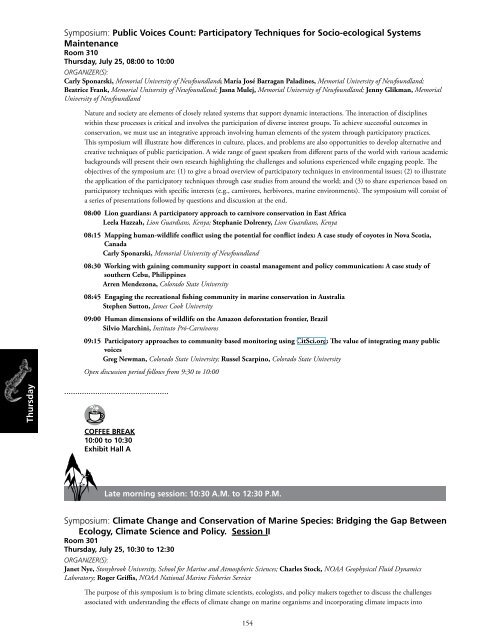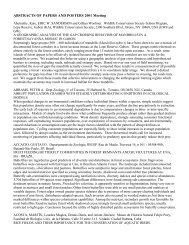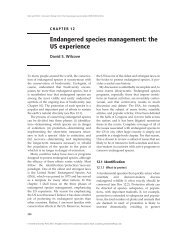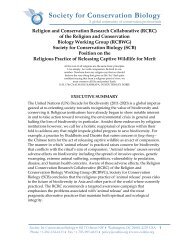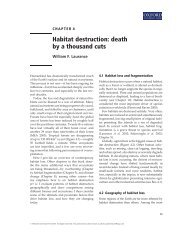ICCB 2013 Program - Society for Conservation Biology
ICCB 2013 Program - Society for Conservation Biology
ICCB 2013 Program - Society for Conservation Biology
You also want an ePaper? Increase the reach of your titles
YUMPU automatically turns print PDFs into web optimized ePapers that Google loves.
Symposium: Public Voices Count: Participatory Techniques <strong>for</strong> Socio-ecological Systems<br />
Maintenance<br />
Room 310<br />
Thursday, July 25, 08:00 to 10:00<br />
Organizer(s):<br />
Carly Sponarski, Memorial University of Newfoundland; María José Barragan Paladines, Memorial University of Newfoundland;<br />
Beatrice Frank, Memorial University of Newfoundland; Jasna Mulej, Memorial University of Newfoundland; Jenny Glikman, Memorial<br />
University of Newfoundland<br />
Nature and society are elements of closely related systems that support dynamic interactions. The interaction of disciplines<br />
within these processes is critical and involves the participation of diverse interest groups. To achieve successful outcomes in<br />
conservation, we must use an integrative approach involving human elements of the system through participatory practices.<br />
This symposium will illustrate how differences in culture, places, and problems are also opportunities to develop alternative and<br />
creative techniques of public participation. A wide range of guest speakers from different parts of the world with various academic<br />
backgrounds will present their own research highlighting the challenges and solutions experienced while engaging people. The<br />
objectives of the symposium are: (1) to give a broad overview of participatory techniques in environmental issues; (2) to illustrate<br />
the application of the participatory techniques through case studies from around the world; and (3) to share experiences based on<br />
participatory techniques with specific interests (e.g., carnivores, herbivores, marine environments). The symposium will consist of<br />
a series of presentations followed by questions and discussion at the end.<br />
08:00 Lion guardians: A participatory approach to carnivore conservation in East Africa<br />
Leela Hazzah, Lion Guardians, Kenya; Stephanie Dolrenry, Lion Guardians, Kenya<br />
08:15 Mapping human-wildlife conflict using the potential <strong>for</strong> conflict index: A case study of coyotes in Nova Scotia,<br />
Canada<br />
Carly Sponarski, Memorial University of Newfoundland<br />
08:30 Working with gaining community support in coastal management and policy communication: A case study of<br />
southern Cebu, Philippines<br />
Arren Mendezona, Colorado State University<br />
08:45 Engaging the recreational fishing community in marine conservation in Australia<br />
Stephen Sutton, James Cook University<br />
09:00 Human dimensions of wildlife on the Amazon de<strong>for</strong>estation frontier, Brazil<br />
Silvio Marchini, Instituto Pró-Carnívoros<br />
09:15 Participatory approaches to community based monitoring using CitSci.org: The value of integrating many public<br />
voices<br />
Greg Newman, Colorado State University; Russel Scarpino, Colorado State University<br />
Open discussion period follows from 9:30 to 10:00<br />
Thursday<br />
...............................................<br />
Coffee Break<br />
10:00 to 10:30<br />
Exhibit Hall A<br />
late morning session: 10:30 a.m. to 12:30 p.m.<br />
Symposium: Climate Change and <strong>Conservation</strong> of Marine Species: Bridging the Gap Between<br />
Ecology, Climate Science and Policy. Session II<br />
Room 301<br />
Thursday, July 25, 10:30 to 12:30<br />
Organizer(s):<br />
Janet Nye, Stonybrook University, School <strong>for</strong> Marine and Atmospheric Sciences; Charles Stock, NOAA Geophysical Fluid Dynamics<br />
Laboratory; Roger Griffis, NOAA National Marine Fisheries Service<br />
The purpose of this symposium is to bring climate scientists, ecologists, and policy makers together to discuss the challenges<br />
associated with understanding the effects of climate change on marine organisms and incorporating climate impacts into<br />
154


